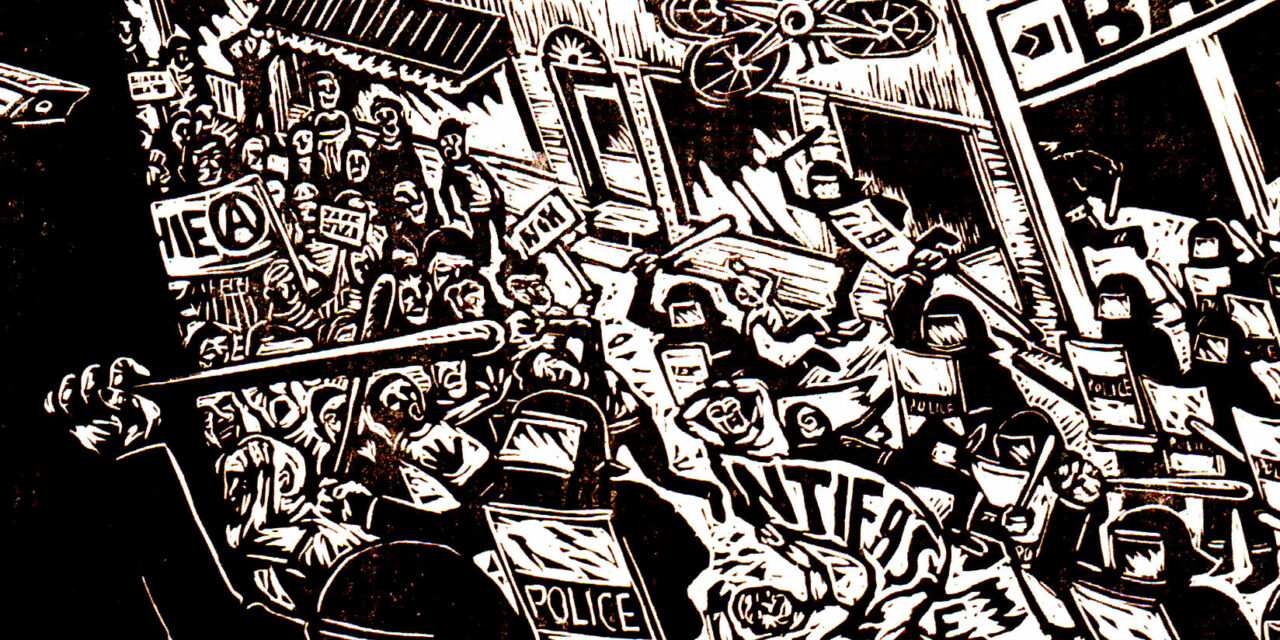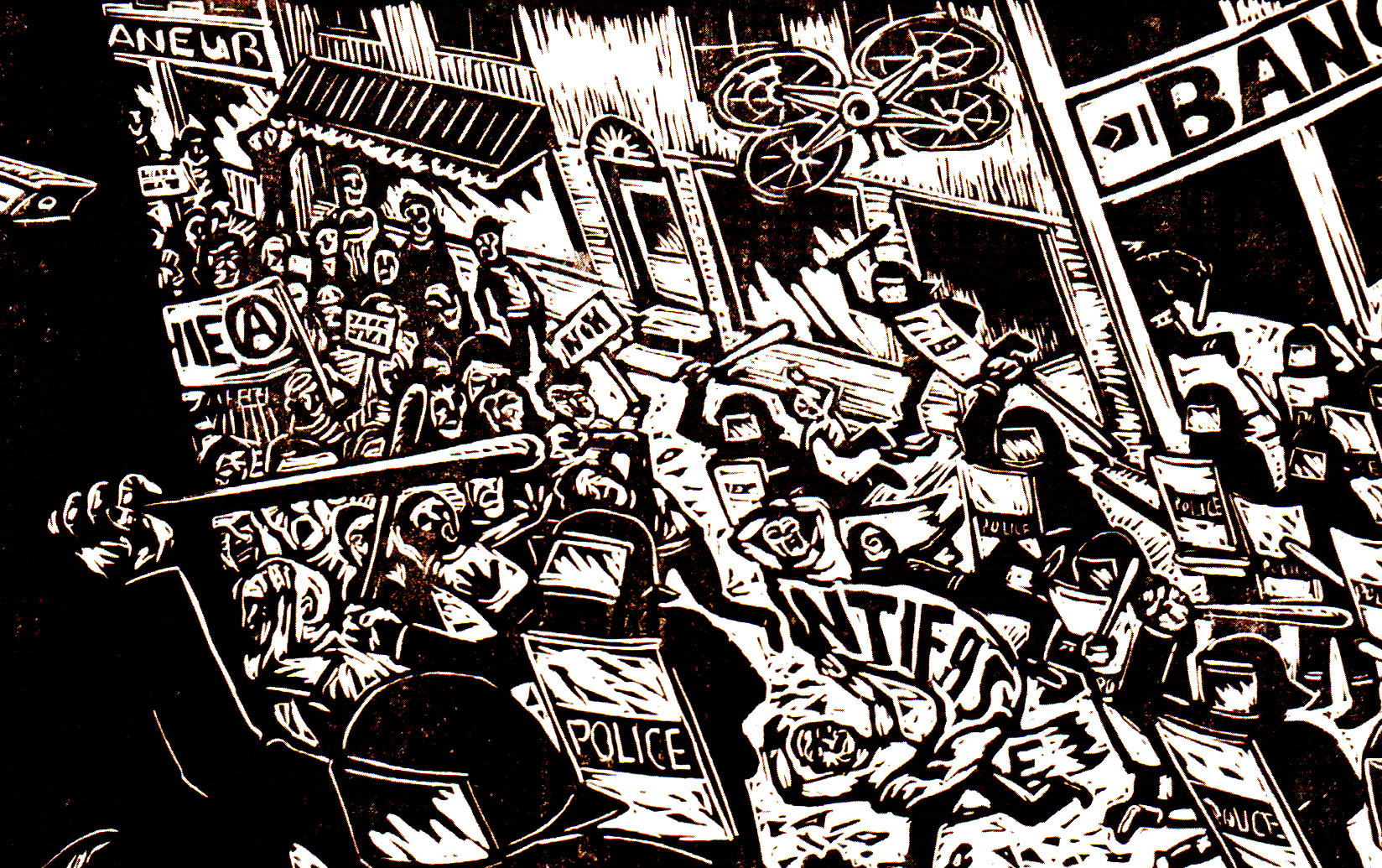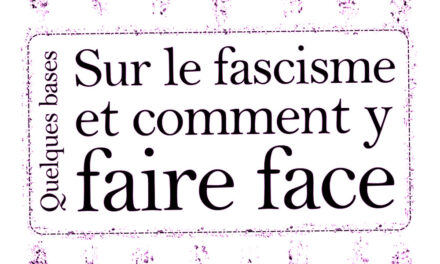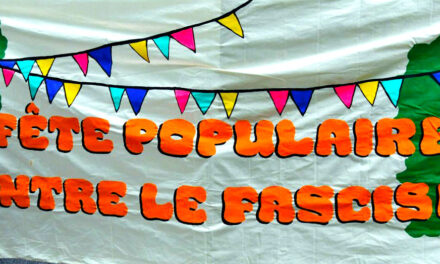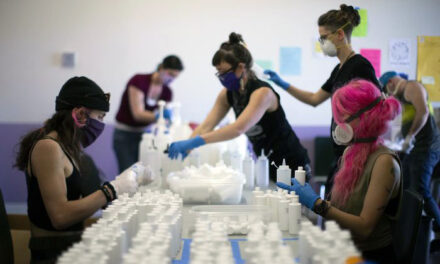An abridged version of this text was produced specially for the “Démasquer la réaction” feature in issue 98 of À Babord magazine (December 2023). Here is the full version of the same text. Illustration: Alex Fatta
///
The Montréal Antifasciste (MAF) collective was formed in the spring of 2017 as a direct response to the xenophobic and Islamophobic rhetoric carried into the public space in an increasingly unabashed manner by organizations with a national-populist leaning like La Meute and outright neo-fascist formations, such as Atalante Québec. In subsequent years, the collective kept an eye on these currents and their protagonists, mapped the Québec far right, and publicly exposed a number of fascist and neo-Nazi individuals and groupuscules, as well as occasionally publishing analyses of the evolving situation on its website. Although it periodically coordinated mobilizations to block the fascists, it’s safe to say that over the years, monitoring these tendencies and publishing information have become the group’s core activities.
The group’s original intention was to shape a broader anti-racist/anti-fascist coalition. The explicit intention, formulated at a founding assembly in the summer of 2017, was to break out of the usual militant circles in an effort to “build a movement.” This ambition gave rise to a series of major demonstrations against hate and racism in Montréal from 2017 to 2019. Unfortunately, under the combined impact of fatigue and the difficulties inherent to this approach (not to mention the paralyzing effects of the COVID-19 pandemic), coalition efforts ran out of steam, and the collective gradually retreated into the monitoring and publishing activities described above.
Despite this setback, MAF has always insisted on the importance of moving collectively to extend the scope of anti-fascism. In the absence of an organized movement such as that spearheaded by the Anti-Racist Action network in the 1990s, we believe that progressive movements must seriously consider how this work can, in fact, be made more general. For our part, we’ve come to the conclusion that before progressive movements (feminist, trade union, queer, human rights, etc.) can consider building a “mass” anti-fascist movement, they must fully embrace antifascism, in the primary sense of the term, and act accordingly in a sustained way.
The first step is to recognize the nature and imminence of the threat.
Resurgence
The peaks and valleys of the last few years aside, it’s clear that we are currently witnessing a resurgence of the far right across the Western world. Recent events in the US, Canada, and Québec leave little room for doubt. Far-right parties are already participating in governments in a number of European countries, in Israel, in India, and elsewhere in the world; Donald Trump is currently leading in the polls in the USA; ditto for the Conservative Party of Canada, which has taken a right-wing populist turn with extremist overtones under the leadership of Pierre Poilievre; and here, the Parti conservateur du Québec has managed to make headway under the leadership of Éric Duhaime, who revived this moribund party by injecting it with a toxic cocktail of the libertarianism and confusionism particularly appealing to conspiracy theory adherents.
In recent years, as a result of a series of interlocking crises, these parties have made a leap forward in their natural rapprochement with the far right. In addition to the anti–health measures rants that were seen during the pandemic, conspiracy-theory fanatics have integrated the obsessions of “American fascists,” who are exerting an ever-greater influence on the institutional politics of our southern neighbours. Fundamentalist networks that advocate a Christian theocracy are working to systematically eliminate the rights acquired over decades by various marginalized populations, in particular by the women’s movement and movements for the liberation and protection of sexual and gender minorities. For some time now, both here and elsewhere in Canada, the crusade to demonize queer and transgender communities being waged by forces opposed drag queen story hours and sex education in general has been picking up speed.
Then there are the Nazis back in the news: not just in the House of Commons either, but in the streets of the United States, France, and elsewhere in the West. For the most part, the fascists and Nazis here are still contained, but as we demonstrate in “The Current Situation of the Far Right in Québec in 2023” (https://montreal-antifasciste.info/en/2023/06/28/the-current-situation-of-the-far-right-in-quebec-in-2023/), these currents always find a way to reconstitute themselves in the shadows and resist their erasure from the public arena. We are speaking here of the fascist and ultra-Catholic ideologues and groups seeking to rehabilitate the heritage of French-Canadian ethnic nationalism, with all that this implies in terms of social regression, particularly for women, immigrants, and minorities. Alexandre Cormier-Denis, the master of racist histrionics who recently managed to promote his trademark by being invited to, then disinvited from, hearings of the parliamentary commission on immigration in Québec City, is an expression of this fascist-tinged ethnonationalist revival.
Obviously, there is good reason to be concerned about the current situation, but beyond legitimate anxiety, we need to take concrete action.
Normalizing Anti-Fascism
Radical antifascism, like all movements considered radical, sometimes has a strained relationship with social movements, but it has always been an integral part of these movement and has always had an (often thankless) role to play. In reality, the caricatured “antifa” are among you: they take part in popular movements to defend basic rights, are active in trade unions, work or volunteer in neighbourhood committees, in the community, and elsewhere in “civil society.” Some even engage in the odious act of voting! These are your colleagues, relatives, and comrades in struggle and in life. You probably meet them every day.
In this respect, it’s worth remembering that anti-fascism is in fact a rearguard position, quietly fulfilling its stated role—flushing out and combating the far right by any means necessary—to defend social movements that, each in its own way and in its own sphere, are moving society as a whole toward greater social justice and economic equality, as well as championing anti-racism, feminism, and anti-colonialism. If there have been virtually no fascists and neo-Nazis on the streets of Montréal since the 1990s, if traditionally victimized communities can live here relatively free from the threat the far right once posed, and if progressive organizations can carry out their mandates without fear of being targeted by the far right, this is in part due to the patient, rigorous, and consistent work carried out to push fascists off of our streets and out of our spaces. It’s all too easy to forget that Montréal is one of the few cities of its size in the world where this situation prevails, and this is largely due to anti-fascists and their sometimes controversial methods.
We continue to believe that anti-fascism is definitionally revolutionary at its core, whatever form it adopts, because it is inseparable from struggles to dismantle the capitalist and colonialist structures that sooner or later foster the rise of fascist ideas and formations, structures faithfully guaranteed by the bourgeois state through its institutions and armed forces. That said, we believe that building an “anti-fascist movement” cannot and must not depend on an “enlightened” vanguard, and even less on a rearguard whose effectiveness depends in part on moving in the shadows. Anti-fascism is first and foremost a frame of reference and a praxis that each and every one of us must take on wherever we find ourselves: in our workplaces, where we study, in our neighbourhoods, in our associations, and in our cultural spaces.
While not everyone can be directly involved in anti-fascist action, we can all promote anti-fascism in our circles, combat prejudice, disseminate anti-fascist information, and provide resources to anti-fascist and allied organizations when the need arises. We can all challenge and deconstruct the racist, sexist, and homophobic reflexes that may still be expressed in our circles, as well as the confusionism and conspiracy theories that tend to infiltrate all areas of life these days. We can all help mobilize in our circles when it is necessary to mount popular self-defence campaigns or take to the streets to block far-right movements, as we had to do in 2023 in the face of the rising transphobic movement. If you don’t belong to an anti-fascist affinity group, there’s nothing to stop you getting involved in the multitude of existing anti-racist, anti-sexist, and anti-colonial projects, or even creating new ones if your immediate circles lack them. Only when these practices are normalized and generalized in all of our milieus will we be able to claim to have a genuine anti-fascist movement.
A right-wing wind is shaking our windows and doors, with an increasing number of politicians falling under its sway and reactionary movements gaining ground. The multiple crises can only exacerbate this movement, cutting right to the very heart of the capitalist system and the states that prop it up. We believe that popular self-defence, the necessary resistance to far-right forces, is the only possible bulwark, and that this bulwark depends entirely on those who still adhere to radical values of justice and equality.
More than ever, it’s up to us to act accordingly, every day.

